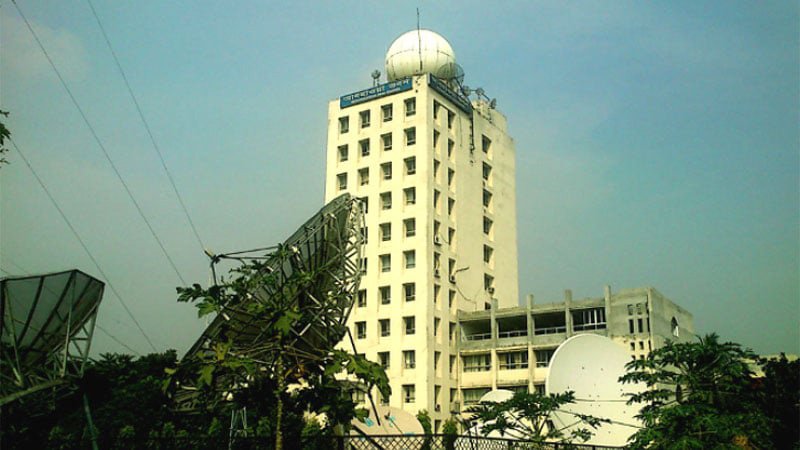Temperature starts falling, may dip more from 5 May
"Maximum temperature has started one or degree Celsius . . . it is an indicator that rainfall is likely to occur from 5 May in most areas in the country,"
Maximum temperature in the country started falling on average one or two degrees Celsius from today, the Met Office said predicting temperature may dip more from 5 May as almost all parts of the country may witness much awaited rainfall.
"Maximum temperature has started one or degree Celsius . . . it is an indicator that rainfall is likely to occur from May 5 in most areas in the country," Md Omar Faruq, a meteorologist of Bangladesh Meteorological Department (BMD) told BSS today.
Analyzing the mathematical model of rainfall index, he said, Bangladesh may witness heavy to very heavy downpour from the next three or four days meaning intense of heat will decrease significantly providing some relief as the entire country braced for more extreme heat since 1 April.
Large swaths of Khulna and Rajshahi division are sweltering through a heatwave as the Met office logged highest temperature above 40 degree Celsius in most stations located in the two divisions since 1 April, Omar said predicting rains are likely to occur in different areas of the two division.
"Northeastern, central parts including Sylhet division and some parts of Mymensingh and Dhaka division are likely to experience heavy to very heavy rainfall from 2 May," Dr Abul Kalam Mallik, BMD meteorologist said.
The meteorologist attributed uncomfortable feelings of unbearable hot-weather to high humidity persisting in the air during the afternoon and evening period suggesting avoiding movement between 12 noon to 4pm as the sunlight is getting too hot as it (the Sun) provides sunlight vertically with intense heat.
"Normally we record temperature from the air," Mallik said the highest temperature was found between 12 noon and 4pm because of vertical position of the Sun.
Analyzing humidity indexes, Mallik continued, "There is a close relation of temperature and humidity . . . discomfort feelings will increase, if high humidity persists in the air with high temperature. "Although temperature decreases after 4pm, but we feel very hot weather due to high humidity," he added.
The Met Office today recorded 41.7 degree Celsius at Chuadanga, the highest temperature of the current year while the temperature in Dhaka was recorded at 37.9 degrees Celsius but the high humidity has exposed the residents to massive discomfort.
The BMD official said the country witnessed the longest duration of the heatwave for the past 30 days since April 1 and the met office warned the phenomenon would continue throughout the next month.
"But unlike the previous heatwaves, this year it spread all over the country," commented meteorologist Abul Kalam Mollik, who was supported by Zebunnesa as well.
Visibly for the first time the meteorologists acknowledged that the climate change phenomenon caused the erratic weather pattern with gradually expanding areas of heatwave, joining the voice with the climate experts and activists.
According to the weather bulletin of BMD issued here today, very severe heat wave is sweeping over the districts of Jashore, Khulna, Chuadanga, Pabna and Rajshahi and severe heat wave is sweeping over the districts of Tangail, Faridpur, Gopalgonj and rest parts of Khulna division.
Mild to moderate heat wave is sweeping elsewhere over the country and it may abate from some places over eastern part of the country, the bulletin said adding day temperature may fall slightly over western part and it may fall by (1-2)oC elsewhere over the country
April is typically hot in Bangladesh as it is in other South and Southeast Asian countries, but according to meteorologists, temperatures this month have been unusually high which was highlighted by international media outlets as well.
According to the New York Times, hundreds of millions of people in South and Southeast Asia were suffering from a grueling heatwave that has forced schools to close, disrupted agriculture, and raised the risk of heat strokes and other health complications.
The recent report also specially acknowledged the Bangladesh scenario saying temperature in some areas soared above 42 degrees Celsius but the "numbers don't quite capture how extreme humidity makes the heat feel even worse".
The schools across the country were closed due to the extreme weather but students are struggling to or doing anything at home as well.
The heatwave has forced the healthcare facilities to take emergency measures to provide medical services with higher number of patients reporting to hospitals with heat-related ailments since the beginning of April while the children and elderly people appeared as the most vulnerable during this prolonged hot weather.
"Large numbers of people are becoming ill with heatstroke, dehydration, exhaustion and breathing problems and they are suffering from other heat-related diseases as well," Director of Mugda Medical College and Hospital Dr Md Niatuzzaman told BSS.
The other hospitals and healthcare facilities including Shishu Hospital, Shaheed Suhrawardy Medical College Hospital and International Centre for Diarrheal Disease Research, Bangladesh (ICDDR,B) reported identical scenarios.
"Nearly, 500 diarrhoea patients have been admitted to the International Centre for Diarrheal Disease Research, Bangladesh (ICDDR,B). A significant number of patients are getting admission to ICDDRB daily," ICDDR'B spokesman AKM Tariful Islam Khan said.
The health ministry issued a directive to take extra measures to face the crisis in hospitals across the country.
Doctors suggested people to stay indoors as much as possible and wear weather-suitable clothes during exposure to sun to protect themselves from heatstroke and take rest after one or two hours during working period alongside consuming more liquid food beside water to avoid dehydration during the heatwave.
"Our brains can tolerate certain level of temperature, if it exceeds people may faint, suffer heatstroke besides suffering from dehydration causing electrolyte imbalance and other complications including kidney dysfunction," former Suhrawardy Hospital director Professor Dr Khalilur Rahman said.

Featured

More From Bangladesh

Latest








